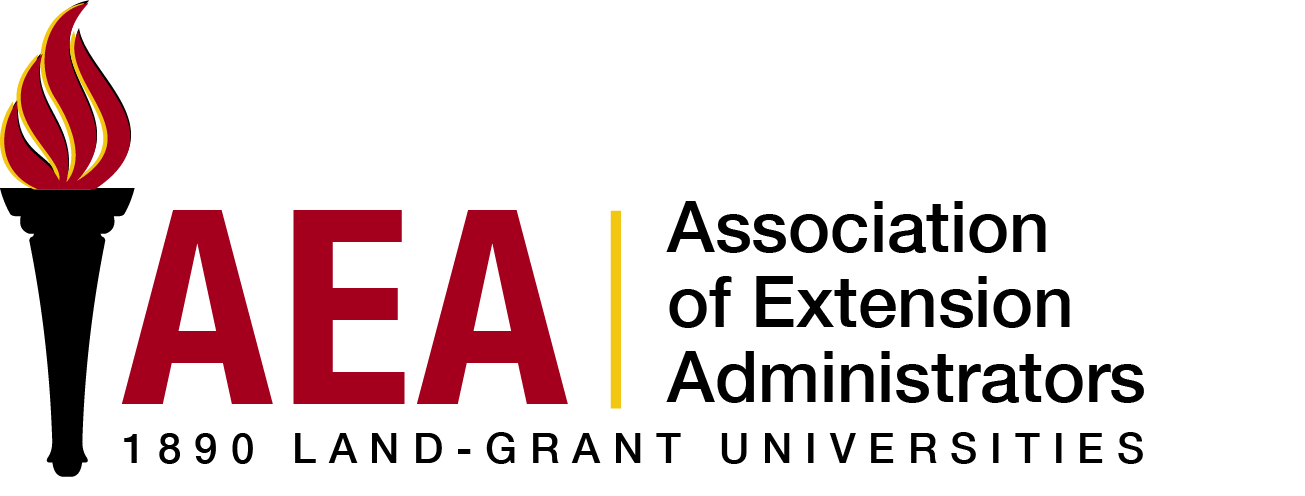Extension Today
News from and about the 1890 Land-Grant Extension SystemMessage from the Chair

Dr. Raymon Shange, 1890 Extension Administrator, Tuskegee University
Sustainable and urban programs within Extension services play a transformative role in addressing food security, environmental stewardship and community resilience. These programs bring agriculture into the heart of cities and suburbs, connecting diverse populations to fresh, locally grown food while promoting healthy food consumption and conservation practices such as composting, controlled environment agriculture and soil health.
By integrating education, hands-on training and community engagement, Extension helps urban residents — especially youths, seniors and beginning farmers — develop and share the skills and knowledge needed to grow food sustainably and contribute to local food systems.
Additionally, these programs serve as catalysts for innovation and collaboration across sectors. They foster partnerships between our land-grant universities, local governments, nonprofits and businesses to create green infrastructure, support local agriculture and revitalize urban spaces. The impact is not only seen in healthier ecosystems and improved access to nutritious food, but also in stronger, more connected communities that are equipped to face future challenges.
Extension horticulture programs
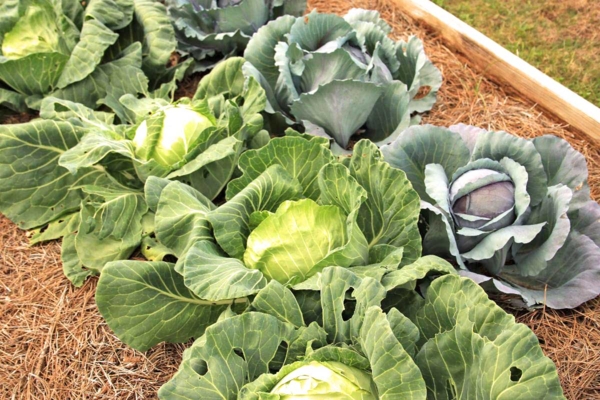
Urban homeowners frequently face a variety of challenges when maintaining their lawns and gardens, such as weeds, pests, nutrient deficiencies, plant diseases and drainage issues. Extension horticulture programs can offer solutions to these problems. Beyond practical benefits, these programs also promote physical and mental well-being by encouraging outdoor activity and fostering human connections through home and community gardening. Additionally, well-maintained gardens can help sustain the environment, increase the consumption of fresh produce and reduce food insecurity among single and family households.
Urban Green
The Alabama Cooperative Extension System’s Home Horticulture: Urban Green program, for example, provides urban residents with sustainable practices to manage landscapes, urban gardens and pests. Its Back-2-Basics online series specifically delivers basic gardening and landscaping practices for people with limited space.
Urban Green impacts
In 2024, survey results from 2,637 Urban Green participants indicated the following:
- 84% increase in knowing the importance of water irrigation systems and 68% increase in learning at least four ways to conserve water in a garden.
- 85% increase in knowing how to use cultivation practices to control weeds.
- 92% increase in the importance of identifying beneficial insects.
Additionally, 40% of these program participants expressed interest in learning how to start, manage and maintain a backyard or community garden. Extension horticulture programs, like Urban Green, are their answer to learning basic gardening tips that can minimize negative environmental impacts, reduce food insecurity and increase the intake of fresh fruits and vegetables, particularly in urban food deserts. Visit Urban Green to learn more.
Let’s Grow Together: Growing food, knowledge, community roots in Vicksburg
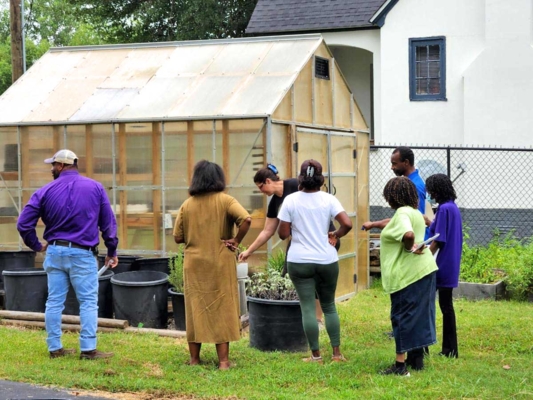
At the intersection of food, sustainability and community empowerment, Let’s Grow Together, an initiative of Alcorn State University’s Extension Program, is planting more than crops. It’s cultivating skills, relationships and a renewed sense of ownership over local food systems. Through a seasonally tailored workshop series hosted at Julie’s Memorial Community Garden in Vicksburg, Mississippi, this program is transforming how communities connect with their land and with each other.
The series offers hands-on education in everything from soil testing and seed starting to pest management and seasonal planting strategies. But its deeper mission lies in creating accessible entry points for people of all backgrounds, especially home gardeners, small-scale growers and community garden volunteers, who want to strengthen their growing skills and build a resilient food future.
Julie’s Memorial Community Garden serves as a meaningful and symbolic starting point. Volunteer-led and deeply rooted in the local community, the garden reflects the kind of space Let’s Grow Together seeks to support and uplift. However, organizers are clear: Julie’s is just the beginning. The long-term vision is to partner with additional gardens, growers and neighborhoods across the region to expand the program’s footprint and impact.
“This isn’t just about one garden,” said Velma Oliver, farm management and small farm loan specialist at Alcorn’s Mississippi Small Farm and Agribusiness Center. “This is about building momentum – helping people reclaim their knowledge of how to grow, harvest and preserve food, and doing it in ways that bring our communities closer together.”
Building financial confidence with Money Smart for Adults
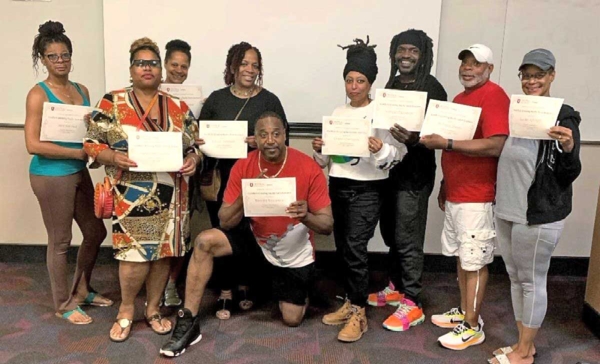
Central State University Extension’s (CSUE) Community and Economic Development educators are actively empowering Ohioans through financial literacy education. Drawing on the research-based Money Smart curriculum developed by the Federal Deposit Insurance Corporation, educators have completed virtual training sessions and are now equipped to deliver impactful financial literacy workshops across communities and CSUE’s coverage areas throughout the state.
“Money Smart for Adults allows us to meet people where they are, whether they’re rebuilding credit, learning to budget or planning for the future,” said Extension Educator Stephen Washington of the Northeast Ohio Community and Economic Development group. “It’s about giving adults the confidence and tools to take control of their financial journey.”
The Money Smart for Adults curriculum is designed to help participants gain practical financial knowledge, build essential skills and access resources that foster financial confidence. Workshops are offered in flexible formats, ranging from four to 13 sessions, and focus on helping participants learn how to improve their credit scores, create and manage budgets, and take meaningful steps toward financial literacy. The impacts of Money Smart classes are helping participants gain financial literacy to not only improve their personal and family finances but also to build a solid foundation to start their own businesses.
Through these initiatives, Central State University Extension continues to advance economic empowerment and financial resilience across Ohio’s communities – one workshop at a time.
Sustainable urban programs: Growing food, community, opportunity in Delaware
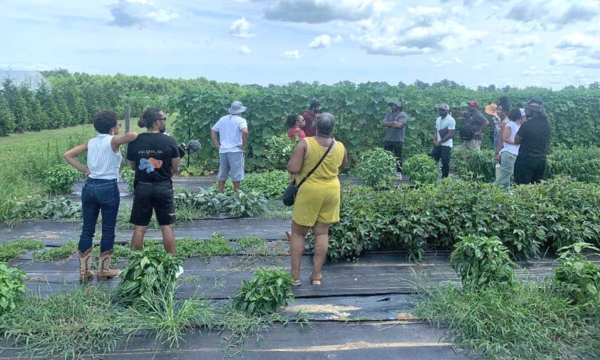
Delaware’s urban agriculture scene is thriving, thanks to innovative partnerships and programs led by Delaware State University’s (DSU) Small Farms team. In 2025, two standout events — the opening of the Messiah Market in Wilmington and the Delaware Bus Tour and Farm Crawl — demonstrated the transformative power of urban farming for community health, food access and economic growth.
Messiah Market: A hub for food, healing and connection
On July 7, Jamie Shanklin Spencer, a minority-owned small farm operator, opened the Messiah Market, a farmers and holistic market that blends food sovereignty with community healing. Located in Wilmington, the market serves as a safe, vibrant space for neighbors, farmers and changemakers from across the Mid-Atlantic to connect.
The market’s mission is multi-faceted:
- Educating new farmers and gardeners in agricultural production.
- Increasing access to fresh, seasonal produce and herbal products.
- Promoting health and wellness for all demographics.
- Hosting community events in a safe, inclusive environment.
As a key partner, DSU’s Small Farms program provides agricultural workshops, risk management training and agribusiness support. In 2025, DSU delivered a Community Garden and Urban Farm Series at the Market, covering topics from garden tillage and technology in agriculture to food safety and nutrition. Agribusiness Extension Specialist Andy Wetherill also provided hands-on guidance for managing the Market’s CSA, retail sales and innovative tower garden operations.
Looking ahead
From the vibrant marketplace in Wilmington to the collaborative farm crawl, DSU’s urban agriculture initiatives are planting seeds for sustainable food systems, economic opportunity and healthier communities. These programs demonstrate that urban farming is more than growing crops — it’s growing community power.
Growing together: FAMU Extension’s sustainable urban agriculture in West Palm Beach
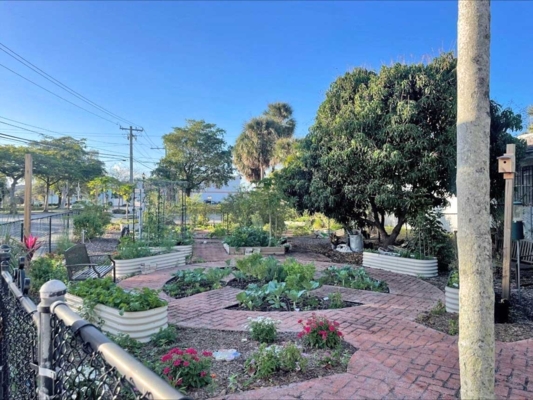
Two thriving green spaces, Coleman Park Community Garden and Pleasant City Community Garden, are transforming West Palm Beach neighborhoods through a partnership between the city of West Palm Beach and Florida A&M University (FAMU) Cooperative Extension.
These gardens provide residents with fresh, locally grown produce while teaching practical, sustainable growing practices, such as composting, water conservation and integrated pest management. Hands-on workshops and community events empower participants to grow their own food, improve food security and strengthen community connections.
“These gardens are more than places to grow fruits and vegetables — they are hubs of education and empowerment,” said FAMU Urban Agriculture Extension Agent Tavia Gordon.
By engaging residents, youth groups and local organizations, the gardens foster pride, wellness and resilience. Together, Coleman Park and Pleasant City Community Gardens are helping build healthier neighborhoods — one harvest at a time.
For details on volunteering or upcoming workshops, contact the city of West Palm Beach Housing and Community Development Department or FAMU Cooperative Extension at tavia.gordon@famu.edu.
Pleasant City Community Garden
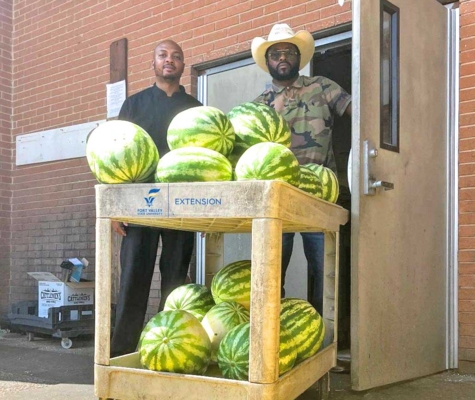
Fort Valley State University (FVSU) is cultivating a vibrant array of crops at its Sustainable Demonstration Area and Organic Farm Site, including eggplants, bell peppers, hot peppers, okra, tomatoes, sweet potatoes, watermelons, cantaloupes and muscadines.
As students return to campus this August, the fruits of this labor will make their way to the FVSU dining facility. According to James Brown, Ph.D., program leader for Agricultural and Natural Resources, the university will begin selling its farm-grown produce to Sodexo, the company managing campus dining services.
“Sodexo will be purchasing the produce as we proceed through the process,” Brown said, noting that this marks the second year of collaboration between Cooperative Extension and Sodexo.
Last year’s initiative was met with enthusiasm, as faculty, staff and students enjoyed meals featuring fresh, locally grown produce. Brown said the campus community is eager for another season of flavorful, farm-to-table dining.
The partnership not only supports sustainable agriculture but also enhances student wellness and engagement with locally sourced food. Brown said it is a win-win for the university and its commitment to healthy living and hands-on agricultural education.
Langston University, Oklahoma State University launch Oklahoma Master Food Preserver Program
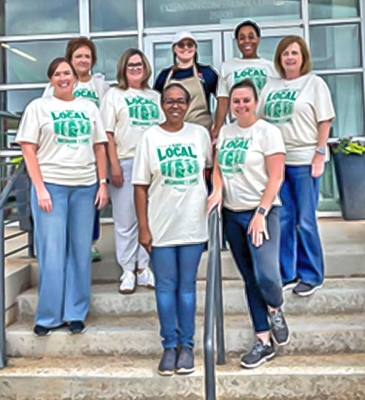
The Cooperative Extension and Outreach Programs of Langston University and Oklahoma State University partnered to launch the Oklahoma Master Food Preserver (MFP) Program, the first of its kind in the state. This innovative initiative strengthens food security and sustainability in Oklahoma’s urban counties by teaching residents safe and effective food preservation techniques.
Participants in the program receive hands-on training in various preservation methods, including pressure canning, water bath canning, steam canning, fermentation, freezing and dehydrating. These essential skills reduce food waste, preserve local harvests and contribute to community resilience.
In May 2025, the MFP team hosted a three-day intensive training for Extension educators representing 25 counties across Oklahoma. Educators were trained not only in preservation techniques but also in testing and calibrating dial gauge pressure canners to ensure food safety. Approximately 60 pounds of fresh produce were used in the training to prepare multiple recipes, demonstrating the program’s immediate role in reducing food waste while producing shelf-stable, nutritious foods.
An additional volunteer training session is scheduled for October. Volunteers will work under the supervision of certified county educators and are expected to contribute a minimum of 20 volunteer hours annually, helping to expand food safety and preservation education statewide.
The Oklahoma MFP Program is supported by Langston University Sherman Lewis School of Agriculture and Applied Sciences, Oklahoma State University and the Sustainable Agriculture Research and Education program. The state’s first certified Master Food Preservers include Dr. Tiffany Williams (LU-CEOP, family and consumers sciences program leader), Keisha Scott (LU-CEOP, FCS educator) and Christi Evans (OSU assistant state Extension specialist for food safety). Together, they conduct workshops and outreach across Oklahoma.
Lincoln supports growers, communities with sustainable urban programs
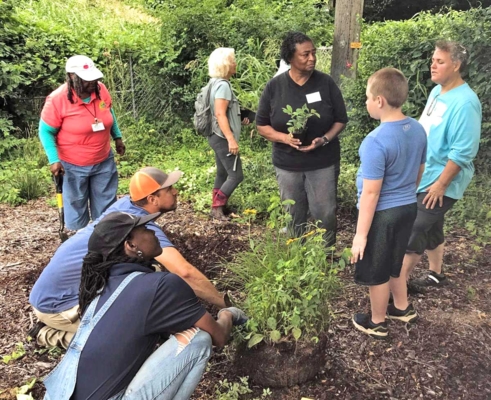
No farm is created equal, and there’s no such thing as the perfect spot. Farms differ from state to state, region to region and even town to town. Growers in any location deal with varying soil types, water levels, tree coverage, elevation and a litany of other variables when deciding to establish a farm or garden.
Those challenges and considerations are even more complicated for urban growers, who face unique challenges due to space constraints and proximity to other people. Fortunately, Lincoln University Cooperative Extension (LUCE) is here to help growers — rural and urban — achieve their farming dreams and, most importantly, become sustainable.
Sustainable farming, and specifically sustainable urban farming, doesn’t have a strict definition. It means different things to different growers and even different LUCE specialists. To LUCE specialists Izula Maximillen, Julia Thompson and Drs. Touria Eaton and Anitha Chitturi, sustainability means a lot of things — community, environmental stewardship, food security and economic stability.
For urban growers, those ideas aren’t luxuries — they’re musts. Sustainable urban farms are often located in underserved communities and food deserts. By producing safe, healthy crops, they support the neighborhoods they serve and become more than just a farm. They become neighborhood assets, acting not only as food sources but as community centers and educational venues.
LUCE and its specialists utilize workshops, farm visits and field days to share research-based programming with urban growers to establish sustainable practices and best serve those communities.
Seed library sows sustainability at N.C. A&T community garden
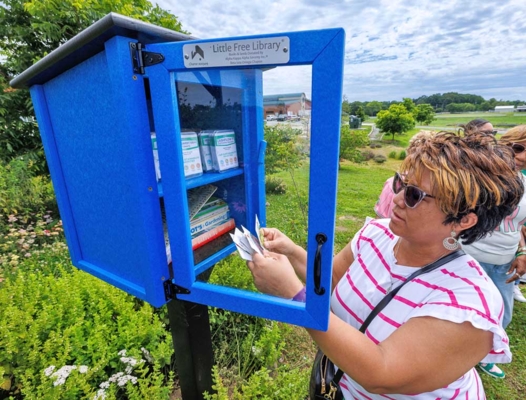
It’s more than a box to members of the Beta Iota Omega chapter of Alpha Kappa Alpha Inc. It’s seeds of love for their community.
The sorority donated a blue box filled with vegetable seeds and gardening books to start a free seed library in the community garden at the North Carolina Agricultural and Technical State University Farm, 3020 McConnell Road. The library, which looks similar to the little free libraries filled with books that populate some city neighborhoods, was dedicated at a June 14 event.
Simone Langley, Beta Iota Omega chapter president, said the idea is for people to “get some seeds and get some material to help them understand how to grow their own garden, so that we can improve our own nutrition in our homes.”
“This was something different for us to do, to provide a little free library here at the University Farm that can stay for years and years,” said Enyonam Williams, co-chair of the Enhance our Environment Committee for Beta Omega.
“We like teaching and providing education for persons to continue to have sustainable sources of food,” said Aja Lee, the committee’s other co-chair.
Morgan Malone, urban agriculture and community gardens coordinator for Cooperative Extension at N.C. A&T, said the free seed library in the community garden is a natural fit.
“It's a space to learn together, to share our knowledge and experience, together with each other,” Malone said.
Growing food, growing community: Hydroponics, sustainable grow systems for seniors in Texas
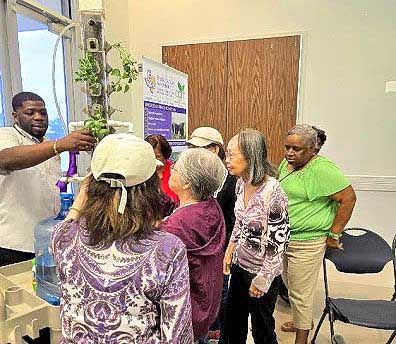
Prairie View A&M University’s Cooperative Extension Program (CEP) Agriculture and Natural Resources team introduced more than 300 Texas seniors to hydroponics — soil-free systems for growing leafy greens, herbs and vegetables year-round. Hands-on workshops in Houston and Dallas, hosted with county agents, featured tabletop units, water-quality basics and seedling planting techniques.
Designed for accessibility, the program used raised beds, waist-high troughs, lightweight tools and color-coded checklists to simplify maintenance and enhance safety. Specialists demonstrated how crops like kale, basil and peppers fit into heart-healthy meals, while offering affordable start-up ideas using repurposed totes, food-grade buckets and compact LED lights.
In Dallas, culturally relevant crops such as mustard greens, collards and okra connected participants to family food traditions.
“Many attendees shared that aquaponics and hydroponics felt ‘doable’ in apartments or small yards, especially for those managing mobility or heat sensitivities,” said Dallas County Agent Bria Cooper.
Beyond food, workshops fostered social connection: peer teams monitored pH, celebrated first roots and organized harvest circles to exchange recipes and seedlings with neighbors and church groups. Extension agents provided home visits, starter kits and simple record logs to track yields, savings and wellness goals.
“Blending heritage foods with modern, water-smart technology empowers older adults to grow nutritious crops, reduce grocery costs and strengthen community resilience,” noted Extension Agent Brukendra Fillmore. With plans to expand demonstration supplies to agents statewide, the program is building both food security and community strength for Texas seniors.
Raised bed community garden to combat food insecurity in Columbia, Orangeburg
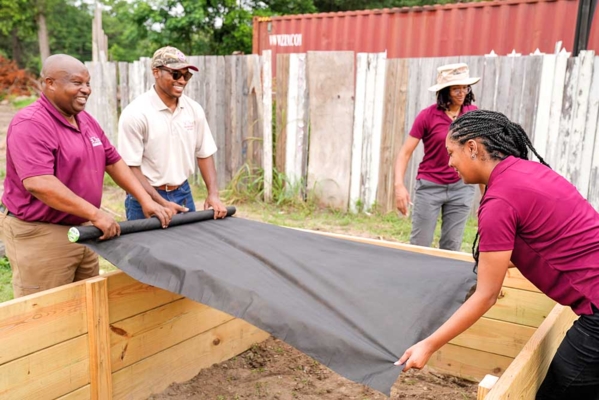
This summer, South Carolina State University’s 1890 Research and Extension program advanced its commitment to community resilience and sustainability through the Urban Agriculture Innovation Grant, funded by TIME Inc.
Led by Dr. Thomas Nyatta, urban agriculture scientist, and Mark Nettles, sustainable agriculture and natural resources agent, the project took root in Columbia and Orangeburg, where local farmers, interns and residents collaborated to create community-raised garden beds.
This project aims to address the challenges of urban food deserts, areas where access to healthy, affordable food is limited, as part of the broader effort to combat food insecurity and increase access to fresh food. According to the South Carolina Department of Public Health, Columbia and Orangeburg alone account for more than 20 identified food deserts, and statewide, South Carolina ranks among the most food-insecure states in the country.
“The Urban Agriculture project strengthens Columbia and Orangeburg through two key efforts: community-raised garden beds that provide fresh fruit and vegetables and microgrants that help farmers and nonprofits increase local food production,” said Nyatta.
“These efforts not only expand access to nutritious foods but also promote healthy eating habits by showing the value of fresh meals. The more people understand the connection between diet and health, the more we can prevent diseases linked to poor, high-calorie diets. Change begins with one person, then a family, then a community–growing toward a healthier nation, one garden at a time.”
The grant also supports educational workshops, outreach to improve U.S. Department of Agriculture program participation and phytoremediation to restore urban soils, cultivating sustainable practices and nourishing neighborhoods.
Out the Mud: Nurturing bright futures through horticulture
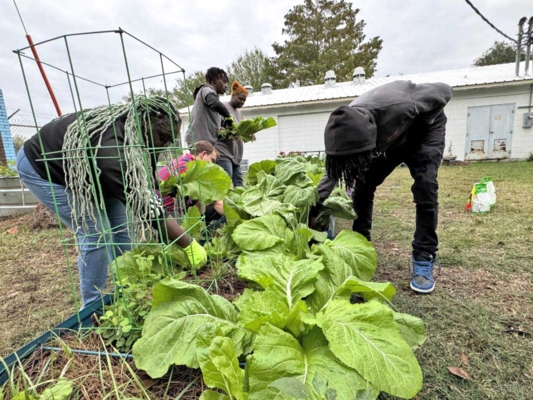
By Stephanie M. Elwood, Southern University Ag Center Horticulture Specialist
The Southern University Agricultural Research and Extension Center (SU Ag Center) is transforming lives through its innovative “Out the Mud” Urban Horticulture Program, providing agricultural training to incarcerated, adjudicated and homeless youths. Operating across multiple campus garden sites, Southern University Ag Center integrates gardening with nutrition education, interpersonal skill development and workforce preparation.
The program’s objectives are clear: to create therapeutic horticulture experiences for youths within correctional facilities and school campuses, to promote healthy lifestyles through nutrition education and to build professional and interpersonal skills that open pathways to careers while strengthening family connections. Participants engage in both classroom instruction and hands-on activities, cultivating and maintaining horticultural garden plots. This dual approach not only equips them with technical knowledge but also fosters teamwork, responsibility and resilience.
Upon completion, participants earn certificates that can be added to résumés and job applications, enhancing their employability in horticulture and related industries. The impact is measurable and inspiring — 72 students have graduated with certifications, with 30% securing agriculture-related employment. Over the past three years, 134 youths have participated in the program, growing more than 500 pounds of fresh produce for their own consumption, reinforcing lessons in nutrition and self-sufficiency.
By combining agriculture, education and personal growth, the SU Ag Center’s multidisciplinary approach works to disrupt cycles of poverty and incarceration. This program not only plants seeds in the soil but also in the minds and futures of young people — seeds of confidence, skills and opportunity — ultimately fostering healthier lives and reducing recidivism.
Innovating urban agriculture in the 21st century
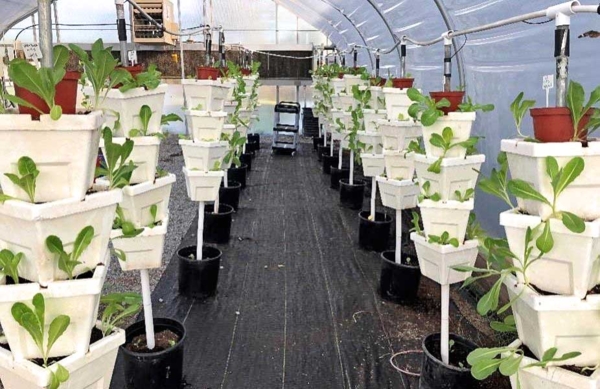
By Dr. Dilip Nandwani
With cities growing rapidly, urban agriculture offers a powerful tool for enhancing food security, public health, local economies, social inclusion and environmental sustainability. Though farming practices vary globally, about one-third of urban residents are involved in the agro-food sector. Despite its potential, limited research and awareness have historically hindered its growth.
In recent decades, diverse urban agriculture projects have emerged — some government-led, others driven by grassroots communities. These initiatives often create green corridors or continuous urban productive landscapes, which not only support biodiversity but also aid climate adaptation and resilience. Concepts like edible landscapes and foodscapes are becoming global trends.
Urban agriculture faces key challenges, especially limited space and sunlight. Innovative solutions — adapted from rural technologies or tailored for urban settings — are addressing these issues. Examples include rooftop greenhouses, vertical gardens on building facades and indoor plant factories using LED lighting.
Once technical barriers are overcome, sustainability becomes paramount. Socially, urban gardens foster inclusion, community bonding and experiential education, especially in schools. Economically, evaluating viability is complex, as benefits beyond food production, such as ecosystem services, must be quantified. Recent studies are helping define sustainable business models.
Environmentally, urban agriculture cuts the city's carbon footprint by reducing food transport, recycling organic waste and cooling urban heat through plant transpiration. These practices also enhance resource efficiency and promote circular systems. As urban agriculture grows, interdisciplinary research is essential to explore its full potential.
TUAIC uses composting to fertilize partnership
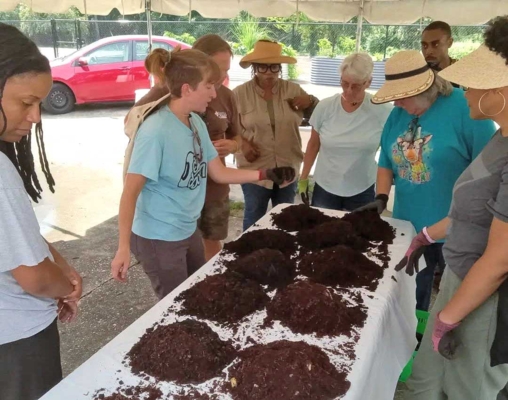
Tuskegee University Urban Agriculture Innovation Center (TUAIC) seeks to be an urban community space that would serve as a community gathering space, providing teaching and learning opportunities that revolve around sustainable urban food systems, food safety, pre-harvest, growing and post-harvest techniques, economic development and youth development.
Part of the teaching and learning component of TUAIC includes various workshops and classes. Recently, TUAIC hosted a workshop in partnership with Eat South on composting. Composting is mixing ingredients used as plant fertilizer and to improve the soil's physical, chemical and biological properties. It is usually made up of decomposing plant and food waste, recycling organic materials and manure.
EAT South is an urban teaching farm that engages the Montgomery, Alabama, community by educating about, gathering people around and growing good food. They aim to change the way food travels from the ground to our plates. EAT South is proud to be a part of Alabama's sustainable agriculture tradition, rooted in the work of George Washington Carver and Booker T. Whatley, which makes them an excellent partner for the Tuskegee University Extension Program.
Dr. Harold Higgins, TUAIC director, and Amanda Edwards, EAT South’s farmer, taught the compost class. The hands-on class covered hot backyard composting, bokashi composting and managing a worm farm. After the class, the participants planted a patch and added the mature compost. The participants received bokashi bran and cover crop seeds. In addition to what the participants received on the day of the class, several area schools received worm farms.
Preschoolers discover joy of gardening, healthy eating at UAPB
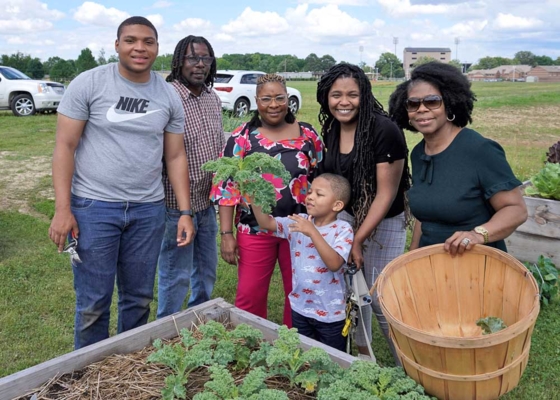
Preschoolers at the University of Arkansas at Pine Bluff Child Development Center (CDC) have been getting their hands in the dirt and reaping the benefits of growing fresh produce in raised beds. The latest gardening project, funded by an Evans-Allen grant, is titled “Implementing Healthy Eating Habits While Combatting Obesity in Preschool Settings.”
Dr. Marilyn Bailey, interim chair of the UAPB Department of Human Sciences, said the centerpiece of the project is a demonstration garden site where preschoolers and their parents learn about the planting cycle and soil health, monitor vegetable growth and eventually harvest the fruits of their labor.
Bailey said her demonstration garden was inspired by a conversation she had with a child. One day, while walking through a pre-K classroom, she asked a student if he knew where his French fries came from. He responded, “You know where fries come from, Dr. Bailey. They come from McDonald's.”
Considering the growing phenomenon of food deserts, it is essential that children be taught where food actually comes from, as well as the importance of eating nutritious food, Bailey said.
Low-income families may also have to increasingly rely on growing their own food in the future. That is why the demonstration garden is open to both young children and their parents who are CDC program participants or participants of other local early learning centers.
“The other part of this program consists of our ‘Nutrition Café’ sessions during which children and their parents learn about healthy food options and how to prepare a healthy snack from fresh produce,” Bailey said.
Can robotic agriculture answer urban food security concerns?
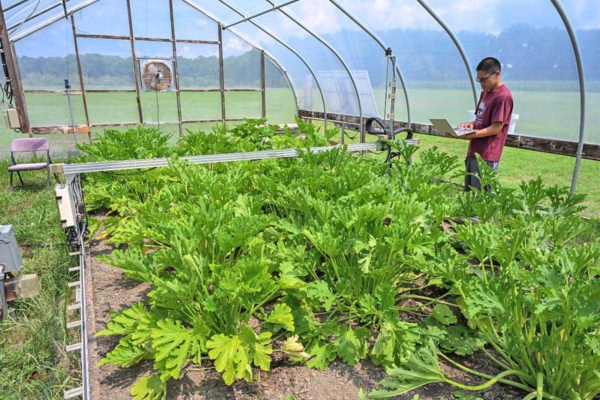
FarmBots are the latest in innovative agriculture, especially in urban farming, where arable land is limited and space is at a premium. The trending term refers to farming with the precision and assistance of robots for planting, watering and weed management. The emerging technology has potential as an energy-smart and sustainable way of growing food in small spaces for a growing population.
Robotic farming, particularly urban and indoor, is the focus of a U.S. Department of Agriculture's National Institute of Food and Agriculture grant-funded project at the University of Maryland Eastern Shore. Madhumi Mitra, professor of biology and environmental science, is leading a team of researchers, including faculty in agriculture, engineering and Extension.
Under the project, zucchini is growing in an outdoor tunnel house, and beets and microgreens are growing in an indoor system. The tunnel house FarmBot uses rainwater irrigation to study the harvest characteristics, phytochemicals and micronutrients of the vegetables. Market analysis to determine the economic viability for farmers and stakeholder surveys measuring the willingness to adopt automated indoor and outdoor farming technology are part of the study.
“Adoption of resilient food systems that reduce waste and strengthen production in urban areas is crucial to addressing global population expansion and creating self-sufficient farming,” Mitra said. “Implementing these systems not only enhances food security and minimizes environmental impact but also provides benefits to growers by promoting sustainable practices and reducing reliance on long supply chains.”
VSU Small Farm Outreach Program drives NUag forward to support urban farmers, shape future policy
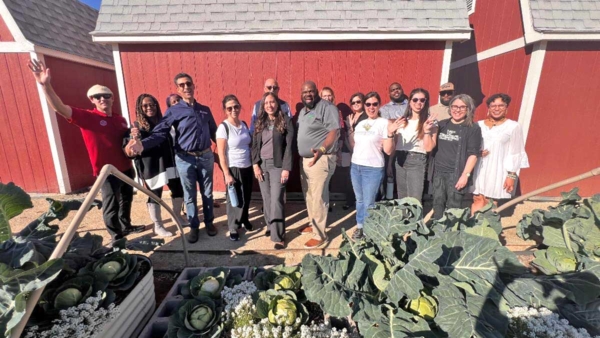
In 2023, Virginia State University’s (VSU) Small Farm Outreach Program secured $4 million in grant funding to establish the National Urban Ag Initiative (NUa). This effort aims to help urban producers access U.S. Department of Agriculture (USDA) and Farm Service Agency resources, as well as create trainings and policy and program recommendations for USDA to better serve urban producers. Many urban farmers are ineligible for federal resources that benefit larger or more rural farms.
VSU is the project lead, developing evidence-based resources and best practices for states to develop programs for their urban farmers. Partners Virginia Tech and Cornell Cooperative Extension are deep in their respective roles, helping the project move forward. At VSU, Briana Stevenson is the NUag coordinator. She coordinates grants between NUag partners, conducts outreach and supports participating coordinators. Right now, Stevenson and her team are creating resources like an online toolkit for organizations.
All 27 cities and tribal nations participating in NUag have been onboarded, and cooperating partners are implementing projects like creating more equitable access to resources or establishing resource centers for urban producers. "We've had great success with our first round of mini grants," says Stevenson.
"Administering low-barrier funding into communities has been one of the most impactful elements; there's been a lot of positive and successful movement with that," she says. “I'm very excited about the momentum and what's to come and coming together with each organization at the end of the project to create one big voice to communicate what needs to change to benefit our urban producers."
Empowering adult learners: STEM Forward program at WVSU prepares participants for high-demand careers
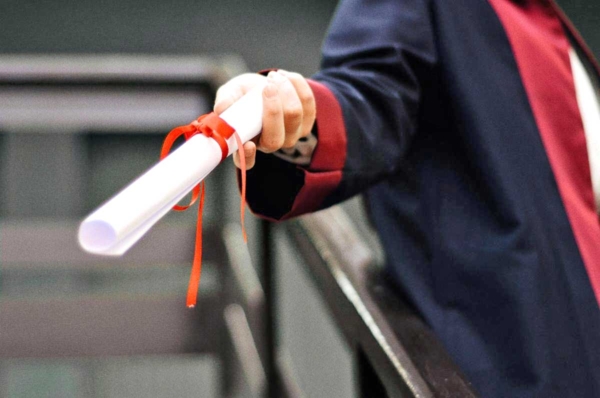
By Alisha Jarrett
The STEM Forward program at West Virginia State University (WVSU) Extension Service is designed to empower adult learners seeking to advance their careers in STEM-related fields. Funded by Dominion Energy, this forward-thinking initiative integrates the ACT WorkKeys National Career Readiness Certification with immersive virtual reality training in skilled trades. Additionally, participants benefit from focused development of soft skills and ongoing mentorship with experienced industry professionals, ensuring well-rounded preparation for the workforce.
Upon successful completion of the full course, participants receive a $125 stipend and a complimentary math grab bag, providing tangible rewards for their commitment.
“The program is structured to help adults develop the confidence and abilities that employers seek, bridging the gap between education and workforce demands,” said Kaysha Jackson, director of urban and non-traditional programming at WVSU Extension. “Through targeted training modules, learners can identify skill gaps, focus on areas needing enhancement and gain readiness for current and future job opportunities.”
STEM Forward also enhances participants’ career prospects by providing industry-recognized certifications, hands-on experience and the opportunity to earn college credits at various institutions, accelerating their academic and professional journeys. The approach combines technical skills development, workplace readiness and valuable mentorship, equipping adult learners with the tools necessary to thrive in high-demand fields. By fostering both technical proficiencies and essential soft skills, STEM Forward supports long-term career growth and empowers adults to navigate career transitions or advancement successfully.
